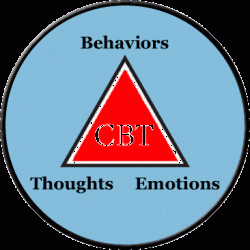10 Benefits Cognitive Behavioral Therapy Has for Your Mental Health
Cognitive behavioral therapy is one of the most common types of psychotherapy treatments for behavioral disorders that can help you recognize unhelpful or maladaptive thought patterns and reactions and to change them or replace them with those that are realistic and helpful. It can be applied across many areas of mental health and has become one of the main psychotherapy treatments for drug and alcohol abuse.

Cognitive behavioral therapy is a popular form of treatment for drug and alcohol abuse.
The 10 benefits cognitive behavioral therapy has for your mental health include:
1) Strategic Focus on the Here and Now
Unlike counseling, which focuses on concrete, external factors, and the resolutions of past problematic issues, cognitive behavioral therapy is mainly focused on how you currently think and act. Cognitive behavioral therapy helps you to reconsider how you think about yourself, the people, and the world around you and to understand how your actions affect how you think and feel.
2) Understanding the Relations
When we think about it, we can see that our beliefs lead to thoughts, which lead to emotions and actions, which can lead to habits, good or bad. At any point in the rationalizing process, knowing that these things are interactive, we can make our lives better by identifying and changing those areas that have contributed to unhealthy behaviors and states of mental health.
3) Identifying Problematic Areas
Cognitive behavioral therapists will instruct you on how to identify and modify irrational thoughts and to correct problematic underlying assumptions or beliefs. According to the NHS, cognitive behavioral therapy”can help you make sense of overwhelming problems by breaking them down into smaller parts.”
The main parts include:
- Situations
- Thoughts
- Emotions
- Physical feelings
- Actions
4) Overcoming Negative Thoughts
You may feel depressed, guilty, or unworthy because of your substance abuse or other maladaptive behaviors and cognitive behavioral therapy will help you overcome negative thoughts about yourself. It will help you to challenge negative thoughts based on evidential experiences and to reinterpret them more realistically. You will also learn techniques on how to recognize when you are in a vulnerable state and how to avoid letting that vulnerability get the best of you.
5) Short Term Treatment with Long Term Effects
Although it may be limited to a certain number of sessions, one of the greatest benefits of cognitive behavioral therapy is that it can be applied to daily life and continuously practiced, providing long term effectiveness as it becomes a part of your automated patterns of thought.
6) Co-Occurring Substance Abuse and Mental Health
Research shows that substance abuse and mental health go hand in hand. A mental health disorder can precede a substance abuse disorder and in contrast, a substance abuse disorder can cause or exacerbate mental health disorders.
Cognitive behavioral therapy can be used at both ends of the spectrum and integrated with other services to treat depression, anxiety, cognitive deficits, memory loss, suicidal tendencies or other psychological health concerns which are common among users.
7) Relapse Prevention
As a relapse prevention therapy, cognitive behavioral therapy will help you to develop skills to cope with your substance abuse disorder and learn how to prevent psychological and emotional “triggers” that could lead to relapse. Environmental influences can trigger thoughts of use, stress or other negative emotions, and physiological responses that cognitive behavioral therapy can help you to recognize quickly and be better able to manage.
Cognitive behavioral therapy will help you to identify and avoid high risk situations, people, places, and things that you have associated with your past behaviors of use and keep you moving in the right directions by using a range of proven skills and strategies to cope with these situations effectively.
8) Controlling Your Thought Processes
You will learn techniques to control your thought processes and to modify them appropriately to keep you from feeling or acting in an unhealthy manner. In fact, the more often you use these techniques, the easier it becomes to develop accurate knowledge about your behaviors and consequences.
According to the National Institute on Drug Abuse, “Cognitive-behavioral strategies are based on the theory that in the development of maladaptive behavioral patterns like substance abuse, learning processes play a critical role.” Using this theory, you can practice learning processes that will help you to view challenging situations more clearly and apply the appropriate and most effective responses to them.
9) Promoting Positivity
Cognitive behavioral therapy promotes positivity by:
- Helping you to move forward into the resolutions of other problems.
- Promoting positive feelings and attitudes toward your behavioral changes and expected outcomes.
- Enhancing your belief in your ability to change.
- Emphasizing your personal relevance in healthy behaviors and promoting moral commitments.
- Helping you to form future plans and goals.
- Enhancing social approval and the approval of significant others.
10) Can Be Used Across a Wide Range of Behavioral Disorders
Although cognitive behavioral therapies are highly beneficial in the treatments of alcohol and drug addictions, it can be also be applied across many areas of mental health to treat problematic disorders such as anxiety, depression, insomnia, post traumatic stress, panic, phobias, eating disorders, and obsessive compulsive disorders.


